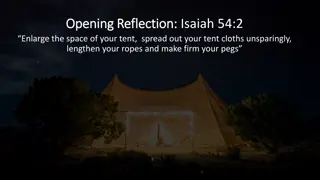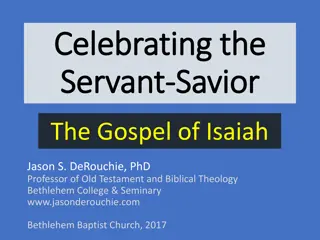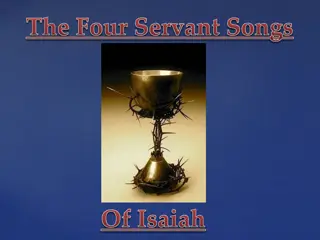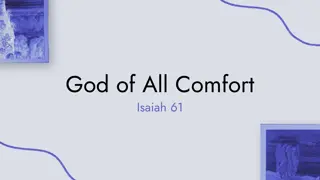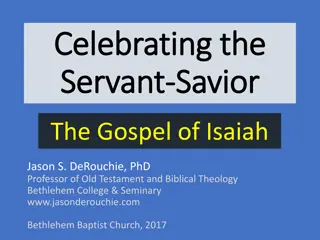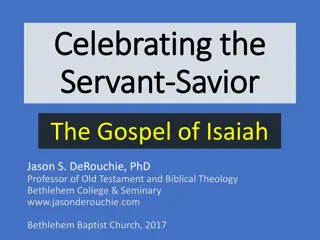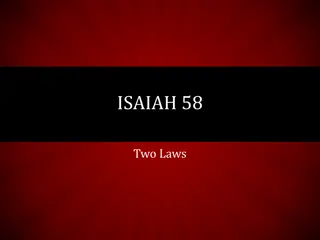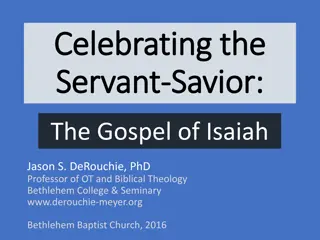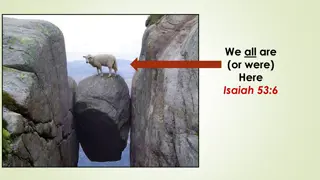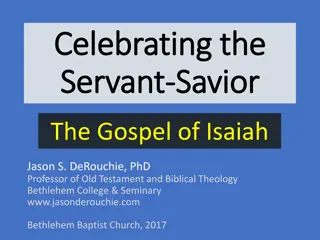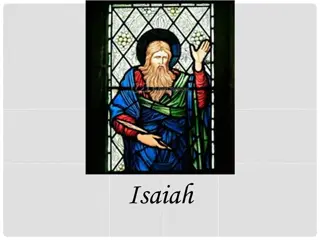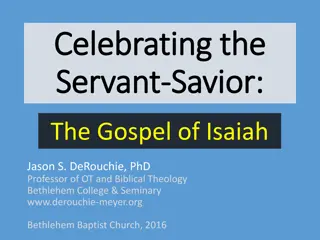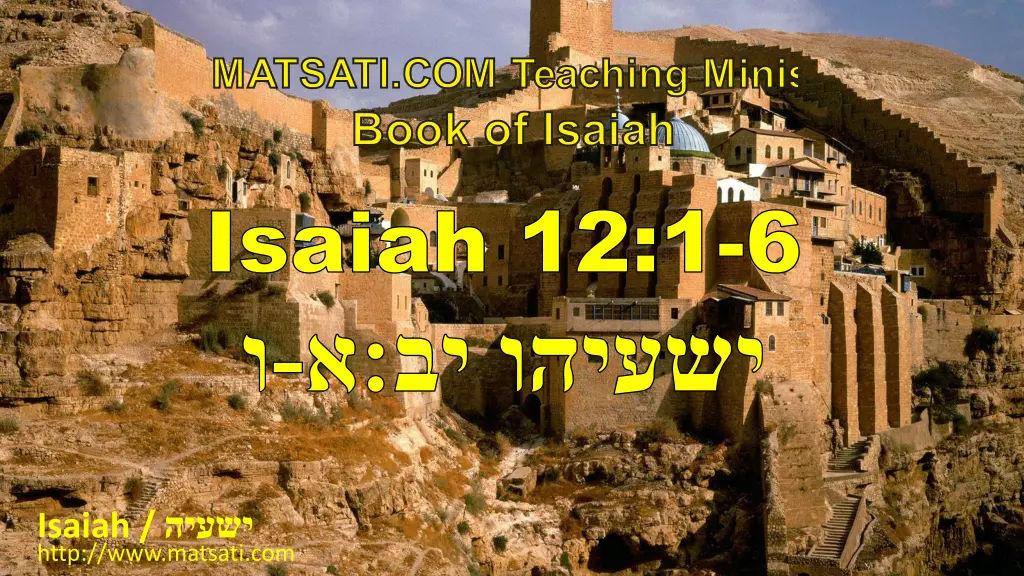
Biblical Verses on Holiness and God's Love
Explore a collection of powerful biblical verses from Isaiah, Psalms, Nehemiah, Romans, Deuteronomy, and 2 Corinthians emphasizing holiness, divine love, mercy, and strength in times of trouble. Reflect on the themes of faithfulness and righteousness as depicted in these sacred texts.
Download Presentation

Please find below an Image/Link to download the presentation.
The content on the website is provided AS IS for your information and personal use only. It may not be sold, licensed, or shared on other websites without obtaining consent from the author. If you encounter any issues during the download, it is possible that the publisher has removed the file from their server.
You are allowed to download the files provided on this website for personal or commercial use, subject to the condition that they are used lawfully. All files are the property of their respective owners.
The content on the website is provided AS IS for your information and personal use only. It may not be sold, licensed, or shared on other websites without obtaining consent from the author.
E N D
Presentation Transcript
Isaiah Isaiah 12:1 : - 12:1- -6 6 Isaiah / http://www.matsati.com
Tehillim / Psalms 22:3 22:3 and you are holy and dwell in the praises of Israel. Isaiah / http://www.matsati.com
Nehemiah 8:9-10 8:9 Then Nehemiah the governor, Ezra the priest and teacher of the Law, and the Levites who were instructing the people said to them all, This day is holy to the Lord your God. Do not mourn or weep. For all the people had been weeping as they listened to the words of the Law. 8:10 Nehemiah said, Go and enjoy choice food and sweet drinks, and send some to those who have nothing prepared. This day is holy to our Lord. Do not grieve, for the joy of the Lord is your strength. Isaiah / http://www.matsati.com
Tehillim / Psalm 34:18 34:18 The Lord is close to the brokenhearted and saves those who are crushed in spirit. (NIV) Tehillim / Psalms 138:7 138:7 Though I walk in the midst of trouble, you preserve my life. You stretch out your hand against the anger of my foes; with your right hand you save me. (NIV) Isaiah / http://www.matsati.com
Tehillim / Psalms 143:1-3 143:1 Lord, hear my prayer, listen to my cry for mercy; in your faithfulness and righteousness come to my relief. 143:2 Do not bring your servant into judgment, for no one living is righteous before you. 143:3 The enemy pursues me, he crushes me to the ground; he makes me dwell in the darkness like those long dead. (NIV) Isaiah / http://www.matsati.com
Romans 5:8 But God demonstrates his own love for us in this: While we were still sinners, Christ died for us. (NIV) , . , . , 1 John 4:9-10 4:9 This is how God showed his love among us: He sent his one and only Son into the world that we might live through him. 4:10 This is love: not that we loved God, but that he loved us and sent his Son as an atoning sacrifice for our sins. (NIV) Isaiah / http://www.matsati.com
- | : - : - - Devarim / Deuteronomy 7:6-7 7:6 For you are a people holy to the LORD your God. The LORD your God has chosen you out of all the peoples on the face of the earth to be his people, his treasured possession. 7:7 The LORD did not set his affection on you and choose you because you were more numerous than other peoples, for you were the fewest of all peoples. . , . , 2 Corinthians 12:9 12:9 But he said to me, "My grace is sufficient for you, for my power is made perfect in weakness." Therefore I will boast all the more gladly about my weaknesses, so that Christ's power may rest on me. (NIV) Isaiah / http://www.matsati.com
- : - Mishley / Proverbs 4:23 4:23 Keep your heart with all diligence, for out of it is the wellspring of life. : Mishley / Proverbs 16:22 16:22 Understanding is a wellspring of life unto him that hath it: but the instruction of fools is folly. Isaiah / http://www.matsati.com
: Tehillim / Psalm 105:1 105:1 O give thanks unto the Lord; call upon his name: make known his deeds among the people. : - [ : ] : : Tehillim / Psalm 145:4-7 145:4 One generation shall praise thy works to another, and shall declare thy mighty acts. 145:5 I will speak of the glorious honor of thy majesty, and of thy wondrous works. 145:6 And men shall speak of the might of thy terrible acts: and I will declare thy greatness. 145:7 They shall abundantly utter the memory of thy great goodness, and shall sing of thy righteousness. Isaiah / http://www.matsati.com
| - - - : Tehillim / Psalm 148:13 148:13 Let them praise the name of the Lord: for his name alone is excellent; his glory is above the earth and heaven. Isaiah / http://www.matsati.com
Rabbinic Literature Part 2 Isaiah / http://www.matsati.com
Targum Jonathan son of Uziel Isaiah 12:1-6 12:1 And thou shalt say at that time, I will confess before Thee, O Lord, for that I have sinned before Thee, Thine anger is upon me; but when I return to the law, Thine anger will turn from me, and Thou wilt have mercy on me. 12:2 Behold, in the WORD of God is my salvation; I am trusting, and shall not be moved, because my strength and my praise is the fear of the Lord: He hath spoken by His WORD, and He is become my Saviour. 12:3 And ye shall receive a new doctrine with joy from the chosen of the righteous. 12:4 And at that time shall ye say, Praise the Lord, pray in His name, declare His doings among the people, remember ye that powerful is His name. 12:5 Praise the Lord, for He has done mighty works; this is revealed in all the earth. 12:6 Cry out and shout, O congregation of Zion, because He is great that promised to cause His Shekinah to dwell in the midst of thee, the Holy One of Israel. (TgJ) Isaiah / http://www.matsati.com
5:45-47 45 . 46 , . 47 , ; John 5:45-47 5:45 Do not think that I will accuse you to the Father: there is one that accuseth you, even Moses, in whom ye trust. 5:46 For had ye believed Moses, ye would have believed me; for he wrote of me. 5:47 But if ye believe not his writings, how shall ye believe my words? (KJV) Isaiah / http://www.matsati.com
Talmud Bavli Niddah 31a:15-16 ' ) , ( Rav Yosef taught: What is the meaning of that which is written: And on that day you shall say: I will give thanks to You, Lord, for You were angry with me; Your anger is turned away, and You comfort me (Isaiah 12:1)? With regard to what matter is the verse speaking? It is referring, for example, to two people who left their homes to go on a business trip. A thorn penetrated the body of one of them, and he was consequently unable to go with his colleague. He started blaspheming and cursing in frustration. After a period of time, he heard that the ship of the other person had sunk in the sea, and realized that the thorn had saved him from death. He then started thanking God and praising Him for his delivery due to the slight pain caused to him by the thorn. This is the meaning of the statement: I will give thanks to You, Lord, for You were angry with me. Therefore, it is stated at the end of the verse: Your anger is turned away, and You comfort me. Isaiah / http://www.matsati.com
Derekh HaShem, Part Two, On Personal Providence 12 Events as means and as ends: However you should know that there are two types of occurrences that happen to people. The first is occurrences that are ends and the second is occurrences that are means. The understanding of ends is occurrences that are decreed upon a person because they are appropriate for him from the angle of one of the causes that we mentioned above. Whereas means are occurrences that happen to him so that another occurrence that is appropriate for him will come to him. And this is like the matter of "I will thank You, O Lord, for You were angry with me" (Isaiah 12:1), which they, may their memory be blessed, explained [is about one] whose cow broke its leg and fell, and he found a treasure underneath it; or one who escaped from an occurrence which should not have come his way - such as if he delayed and hence did not leave on a boat upon which he wanted to leave, and the boat sunk (Niddah 31a). And even these means are possible that they occur to him for his sake or for the sake of someone else, such that, through this, a good or evil will come to that someone. However just like the Supreme Wisdom will determine the matters that are appropriate to come to a person, It will also determine the means by which it will come to him - until everything is decreed with the utmost exactitude about what is truly the best thing. Isaiah / http://www.matsati.com
Orchot Tzadikim 9:73 And thus if a man has any kind of troubles he must rejoice even so. And thus said the Sages : "Beloved are troubles" (Berakoth 5b). And the Sages said also : "He who rejoices in his pain brings salvation to the world" (Ta'anith 8a). And a man should accustom his mouth to say : "This too is for good" (Ta'anith 21a), or "All that the merciful God has done He has done for good" (Berachot 60b). For there are many apparent evils whose end is good, and thus did our Rabbis teach and interpret this portion of Scripture, "I will give thanks unto thee, O Lord; for thou wast angry with me, thine anger is turned away, and thou comfortest me" (Is. 12:1). They explained it with a parable of two men who walked, intending to board a boat. One of them had a thorn stuck into his foot so that he could not board the boat and when his companion boarded the boat the man bruised by the thorn began to curse his "evil fortune". After a time he heard that the boat had sunk and all the people in it had died. Then did he begin to praise the Creator, may He be Blessed, for he realized that the incident with the thorn had saved his life (Niddah 31a). Therefore, should a man rejoice with troubles and with other injuries that may befall him, for he does not know what good will be derived from them in the future. And thus did Nahum the man of Gamzu conduct himself (Ta'anith 21a). Isaiah / http://www.matsati.com
He was traveling to his father-in-laws house, and his possessions were distributed amongst three donkeys; one carrying food, one carrying drink, and one carrying all sorts of delicacies. At one point he stopped to rest along the way, and he was approached by a poor man asking for something to eat. Not realizing how desperate the pauper was, Nahum responded, Wait until I have unloaded the donkey. Before Nahum had the opportunity to unload the donkey, the man died of hunger. Pained by guilt for not responding quickly to the needs of his fellow, Nahum let out a heart- wrenching cry and said, Let my eyes, which had no compassion for your eyes, become blind. Let my hands, which had no compassion for your hands, be cut off. Let my legs, which had no compassion for your legs, be amputated. Nahum was not calmed until he said, Let my entire body be covered with boils. In this way, Nahum explained to his students that he had brought his suffering upon himself, hoping to gain atonement through his suffering. Although Rabbi Yosef Caro (1488-1575) does not usually mention stories in his universally accepted codification of Jewish law, the Shulchan Aruch, this poignant story appears in his laws of Tzedakah, or charity. He writes that one must be very cautious [with giving charity] because it is possible that one could come to spill blood, that a pauper could die if you don t give him immediately, like in the case of Nahum of Gam Zu (Y.D. 247:1). This unusual reference in the Shulchan Aruch draws attention to how important it is to give tzedakah at one s earliest opportunity. Since it is so unlike the style of Rabbi Caro to mention Talmudic stories which have no bearing on the practical law, the appearance of this story is of particular note, and must be taken as a life lesson in the importance not just of giving charity, but of doing so with alacrity (brisk and cheerful readiness). (https://qchabad.org/nachum-of-gamzu-the- ark/) Isaiah / http://www.matsati.com
Rashi on Isaiah 12:2 Parts 1 " , ( ' ): '. " for the strength and the praise of the Eternal the Lord The strength and the praise of the Holy One, blessed be He, that was my salvation. We cannot, however, explain , like , my strength, for we do not find in Scripture ( ) vowelized with a short kamatz, but with a shuruk, reading , with the exception of three places where it is accompanied by . Also, cannot be explained like , my praise, but we are forced to say that is connected to the word following it. Therefore, I say that the yud of 33:16) , He Who dwells in the thornbush. Isaiah / is merely like the yud of (Deut. http://www.matsati.com
Rashi on Isaiah 12:2 Parts 2 . ( the Eternal the Lord Until now His Name was divided, and with the downfall of Amalek, it became whole, and so Scripture states (Exodus 17:16): For the hand is on the throne of the Eternal ( ), implying that the throne is incomplete and the Name is incomplete until the Lord wages war against Amalek. . ' was my salvation. Heb. , like salvation, and it is customary for Scripture to speak in this manner. Comp. (Exodus 9:21) And he who did not heed the word of the Lord, left ( ) his slaves and his cattle ; also, in II Chronicles (10:17): And the children of Israel who dwelt in the cities of Judah, Rehoboam reigned ( ) over them. It should say, . Isaiah / : ) ' : , was to me for a ( ') ( ') : http://www.matsati.com

